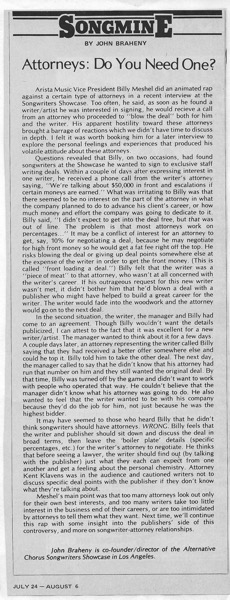A John Braheny Songmine column from the archives…

Accession Number: C000000137-033-002 Document/Digital File, “Songmine: Attorneys: Do You Need One? by John Braheny”, OCR converted text under same Accession Number
(Digitally converted text. Some errors may occur)
Arista Music Vice President Billy Meshel did an animated rap against a certain type of attorneys in a recent interview at’ the Songwriters Showcase. Too often, he said, as soon as he found a writer/artist he was interested in signing, he would recieve .a call from an attorney who proceeded to “blow the deal” both for him and the writer. His apparent hostility toward these attorneys brought a barrage of reactions which we didn’t have time to discuss in depth. I felt it was worth booking him for a later interview to explore the personal feelings, and experiences that produced his volatile attitude about these attorneys.
Questions revealed that Billy, on two occasions, had found songwriters at the Showcase he wanted to sign to exclusive staff writing deals. Within a couple of days after expressing interest in one writer, he received a phone call from the writer’s attorney saying, “We’re talking about $50,000 in front and escalations if certain moneys are earned.” What was irritating to Billy was that there seemed to be no interest on the part of the attorney in what the company planned to do to advance his client’s career, or how much money and effort the company was going to dedicate to it. Billy said, “I didn’t expect to get into the deal free, but that was out of line. The problem is that most attorneys work on percentages…” It may be a conflict of interest for an attorney to get, say, 10% for negotiating a deal, because he may negotiate for high front money so he would get a fat fee right off the top. He risks blowing the deal or giving up deal points somewhere else at the expense of the writer in order to get the front money. (This is called “front loading a deal.”) Billy felt that the writer was a “piece of meat” to that attorney, who wasn’t at all concerned with the writer’s career. If his outrageous request for this new writer wasn’t met, it didn’t bother him that he’d blown a deal with a publisher who might have helped to build a great career for the writer. The writer would fade into the woodwork and the attorney would go on to the next deal.
In the second situation, the writer, the manager and Billy had come to an agreement. Though Billy wouldn’t want the details publicized, I can attest to the fact that it was excellent for a new writer/artist. The manager wanted to think about it for a few days. A couple days later, an attorney representing the writer called Billy saying that they had received a better offer somewhere else and could he top it. Billy told him to take the other deal. The next day, the manager called to say that he didn’t know that his attorney had run that number on him and they still wanted the original deal. By that time, Billy was turned off by the game and didn’t want to work with people who operated that way. He couldn’t believe that the manager didn’t know what his attorney was going to do. He also wanted to feel that the writer wanted to be with his company because they’d do the job for him, not just because he was the highest bidder.
It may have seemed to those who heard Billy that he didn’t think songwriters should have attorneys. WRONG. Billy feels that the writer and publisher should sit down and discuss the deal in broad terms, then leave the ‘boiler plate’ details (specific percentages, etc.) for the writer’s attorney to negotiate. He thinks that before seeing a lawyer, the writer should find out (by talking with the publisher) just what they each can expect from one another and get a feeling about the personal chemistry. Attorney Kent Klavens was in the audience and cautioned writers not to discuss specific deal points with the publisher if they don’t know what they’re talking about.
Meshel’s main point was that too many attorneys look out only for their own best interests, and too many writers take too little interest in the business end of their careers, or are too intimidated by attorneys to tell them what they want. Next time, we’ll continue this rap with some insight into the publishers’ side of this controversy, and more on songwriter-attorney relationships.
See all previous entries in the Songmine Series
About Songmine and Music Connection Magazine:
John Braheny met Eric Bettelli and Michael Dolan right before they were going to publish Music Connection magazine. Eric and Michael wanted to get their publication out to as many songwriters as they could. They had already heard of the LA Songwriters Showcase, and of John and his partner, Len Chandler. John’s goal was to advertise the schedule of guest speakers and performers at the weekly Showcase… so they made a deal.
They published John’s Songmine column (he had never before written a magazine article!) in their very first edition, in November 1977. Trading out the column for advertising, this arrangement continued for many years. Plus, Eric and Michael came to the Showcase each week and distributed free copies to the songwriters!
Those articles became so popular that (book agent and editor) Ronny Schiff offered John’s articles to F&W Media, where they became the backbone of John’s textbook, The Craft and Business of Songwriting. As a follow-up, Dan Kimpel (author, songwriter, teacher), who had also worked at LASS, took on the Songwriting column at Music Connection magazine which continues to this day! You can subscribe to get either hard copies or online.
No comments yet.